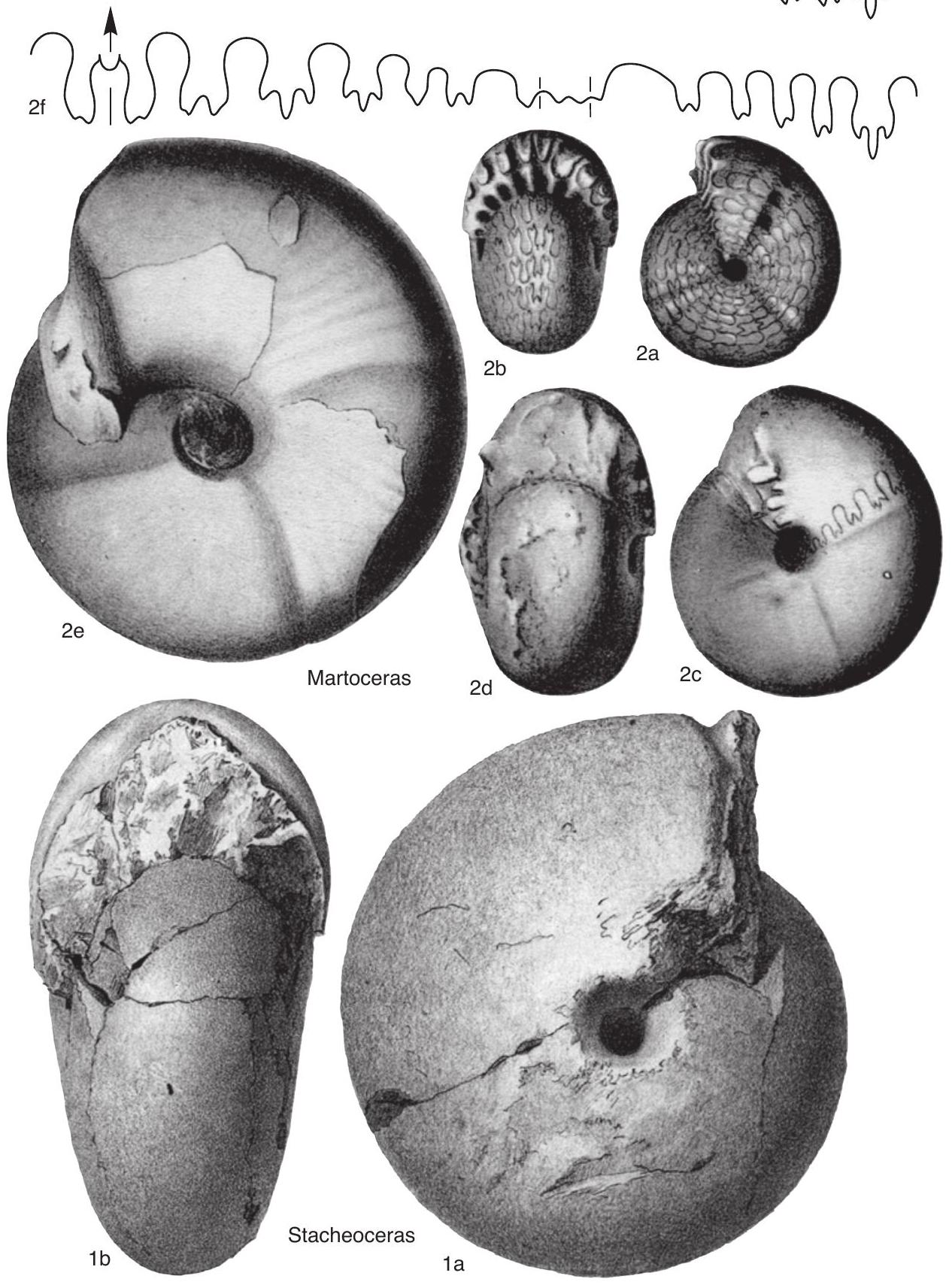Welcome to the Treatise on Invertebrate Paleontology!
Please enter a genera name to retrieve more information.

Stacheoceras
Classification
Phylum:
Mollusca
Class:
Cephalopoda
Subclass:
Ammonoidea
Order:
Goniatitida
Suborder:
Goniatitina
Superfamily:
Cycloloboidea
Family:
Vidrioceratidae
Formal Genus Name and Reference:
Stacheoceras GEMMELLARO, 1887, p. 26
Type Species:
S. mediterraneum Gemmellaro, 1887, p. 29, SD DIENER, 1921, p. 22
Images
(Click to enlarge in a new window)
Fig. 92, 1 a-b . * S. mediterraneum, Sosio Limestone, Wordian, Sicily, lectotype (herein), MGUP 68 of Gemmellaro (1887, pl. 4, 2-3), X 1 (Gemmellaro, 1887).-Fig. 92, 1c. S. toumanskyae Miller & Furnish, La Difunta beds, Capitanian, Guadalupian, Coahuila, Mexico, diameter at 30 mm (Miller & Furnish, 1940a).
Synonyms
Geographic Distribution
Italy (Sicily), Slovenia, Ukraine (Crimea), Azerbaijan (Caucasus), Tajikistan (Pamir), Afghanistan, Iraq (Kurdistan), Oman, Tunisia (Djebel Tebaga), Pakistan (Salt Range), India (Himalayas), China (Gansu, Xinjiang, Yunnan, Guizhou, Xizang, ?Hunan, ?Guangxi, Zhejiang, Sichuan), Indonesia (Timor), Malaysia, Madagascar, Japan (Kitakami), Mexico (Coahuila, ?Guerrero), USA (Texas, California, Wyoming), Canada (Ellesmere Island, British Columbia), East Greenland
Age Range
Beginning Stage in Treatise Usage:
Cisuralian (Artinskian Aktastinian)
Beginning International Stage:
Artinskian
Fraction Up In Beginning Stage:
0
Beginning Date:
290.51
Ending Stage in Treatise Usage:
Lopingian (Changhsingian)
Ending International Stage:
Changhsingian
Fraction Up In Ending Stage:
100
Ending Date:
251.9
Description
Advanced vidrioceratids that may exceed 10 cm in mature conch diameter. Mature modifications comprise deep subterminal constriction and associated flare (expansion) of the peristome and long narrow ventrolateral lappets. External suture consists of 6–12 pairs of lateral lobes; prongs of ventral lobe (V1 ) are bidentate or tridentate, and first external lateral lobe (L 2 ) is bidentate to quadridentate. Internal suture generally has one less pair of lobes than external; most internal lobes exhibit conspicuous dorsal flexure adapically. Sutural formula for moderately complex forms: (V1 V1 )L2 L1 L2.1 L2.1.1 L2.1 .1.1 L2.1.1.1.1 (L2.1.1.1.1.1 L2.1.1.1.1.1 )U2 U1 U2 :I2.1.1.1 L2.1.1.1 I2.1.1 I2.1I1I2D [Russian]. Forty-three species.
References
Museum or Author Information
Classification
Phylum:
Mollusca
Class:
Cephalopoda
Subclass:
Ammonoidea
Order:
Goniatitida
Suborder:
Goniatitina
Superfamily:
Cycloloboidea
Family:
Vidrioceratidae
Formal Genus Name and Reference:
Stacheoceras GEMMELLARO, 1887, p. 26
Type Species:
S. mediterraneum Gemmellaro, 1887, p. 29, SD DIENER, 1921, p. 22
Images
(Click to enlarge in a new window)
Fig. 92, 1 a-b . * S. mediterraneum, Sosio Limestone, Wordian, Sicily, lectotype (herein), MGUP 68 of Gemmellaro (1887, pl. 4, 2-3), X 1 (Gemmellaro, 1887).-Fig. 92, 1c. S. toumanskyae Miller & Furnish, La Difunta beds, Capitanian, Guadalupian, Coahuila, Mexico, diameter at 30 mm (Miller & Furnish, 1940a).
Synonyms
Geographic Distribution
Italy (Sicily), Slovenia, Ukraine (Crimea), Azerbaijan (Caucasus), Tajikistan (Pamir), Afghanistan, Iraq (Kurdistan), Oman, Tunisia (Djebel Tebaga), Pakistan (Salt Range), India (Himalayas), China (Gansu, Xinjiang, Yunnan, Guizhou, Xizang, ?Hunan, ?Guangxi, Zhejiang, Sichuan), Indonesia (Timor), Malaysia, Madagascar, Japan (Kitakami), Mexico (Coahuila, ?Guerrero), USA (Texas, California, Wyoming), Canada (Ellesmere Island, British Columbia), East Greenland
Age Range
Beginning Stage in Treatise Usage:
Cisuralian (Artinskian Aktastinian)
Beginning International Stage:
Artinskian
Fraction Up In Beginning Stage:
0
Beginning Date:
290.51
Ending Stage in Treatise Usage:
Lopingian (Changhsingian)
Ending International Stage:
Changhsingian
Fraction Up In Ending Stage:
100
Ending Date:
251.9
Description
Advanced vidrioceratids that may exceed 10 cm in mature conch diameter. Mature modifications comprise deep subterminal constriction and associated flare (expansion) of the peristome and long narrow ventrolateral lappets. External suture consists of 6–12 pairs of lateral lobes; prongs of ventral lobe (V1 ) are bidentate or tridentate, and first external lateral lobe (L 2 ) is bidentate to quadridentate. Internal suture generally has one less pair of lobes than external; most internal lobes exhibit conspicuous dorsal flexure adapically. Sutural formula for moderately complex forms: (V1 V1 )L2 L1 L2.1 L2.1.1 L2.1 .1.1 L2.1.1.1.1 (L2.1.1.1.1.1 L2.1.1.1.1.1 )U2 U1 U2 :I2.1.1.1 L2.1.1.1 I2.1.1 I2.1I1I2D [Russian]. Forty-three species.
